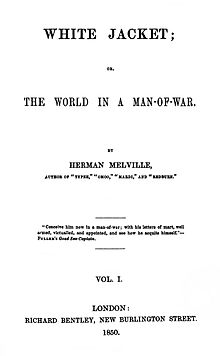White-Jacket

White-Jacket; or, The World in a Man-of-War, usually referred to as White-Jacket, is an 1850 novel by Herman Melville first published in England on January 23 by Richard Bentley and in the U.S. on March 21 by Harper & Brothers.[1] It is based on his fourteen months service in the United States navy, aboard the frigate United States.
Overview
Based on Melville's experiences as a common seaman aboard the frigate USS United States from 1843 to 1844 and stories that other sailors told him, the novel is severely critical of virtually every aspect of American naval life and thus qualifies as Melville's most politically strident work.[citation needed] At the time, though, the one thing that journalists and politicians focused on in the novel was its graphic descriptions of flogging and the horrors caused by its arbitrary use; in fact, because Harper & Bros. made sure the book got into the hands of every member of Congress, White-Jacket was instrumental in abolishing flogging in the U.S. Navy forever. Melville scholars also acknowledge the huge number of parallels between White-Jacket and Billy Budd and view the former as a rich source for possible interpretations of the latter.[2]
The symbolism of the color white, introduced in this novel in the form of the narrator's jacket, is more fully expanded upon in Moby-Dick, where it becomes an all-encompassing "blankness."[3] The mixture of journalism, history, and fiction; the presentation of a sequence of striking characters; the metaphor of a sailing ship as the world in miniature—all of these prefigure his next novel, Moby-Dick.
Characters
This list is not exhaustive.
- White-Jacket, the main character and narrator, so nicknamed because his coat is the only white one on board; a novice sailor (at least on a naval ship), his jacket often gets him into trouble, mostly because of its whiteness
- Jack Chase, a sailor of British origin who is universally regarded by his fellow seamen and even by the officers as the epitome of a true and good sailor; he shows contempt for any man who has shipped out on a whaler
- Captain Claret, a captain of usually severe tendencies, his name reflects the fact that he is also an alcoholic
- Commodore
- Selvagee, a lieutenant whose leadership style is tyrannical
- Mad Jack, a lieutenant whose leadership style is collegial
- Lemsford, a sailor who aspires to be a poet
- Quoin, a sailor "indefatigable in attending to his duties, which consisted in taking care of one division of the guns"[4]
- Nord, a sailor of surly look and melancholy disposition; when White-Jacket first encounters him, the only friend Nord has on board is Lemsford
- Williams
- Wooloo, the commodore's Polynesian servant
- Old Revolver
- Old Combustibles
- Chaplain
- Shakings
- Bland, the ship's master-at-arms
- Emperor Don Pedro II
Publication history
White-Jacket was published in the United States in March 1850. Melville referred to it and his previous book Redburn as "two jobs which I have done for money—being forced to it as other men are to sawing wood."[5]
Legal impact
At the urging of New Hampshire Senator John P. Hale, whose daughter, Lucy, would later become the fiancee of John Wilkes Booth, the murderer of President Abraham Lincoln,[6] the United States Congress banned flogging on all U.S. ships in September 1850.[7] He was inspired by Melville's "vivid description of flogging, a brutal staple of 19th century naval discipline" in his "novelized memoir" White-Jacket.[7]
The man whom Melville based the fictional Commodore on, Thomas ap Catesby Jones, a former commander of the USS United States (1797), was brought up on a court-martial in 1850 and Jones was found guilty on three counts mostly related to "oppression" of junior officers. Jones was relieved of command for two and a half years. In 1853, President Millard Fillmore reinstated him and in 1858, the United States Congress restored his pay.[8]
References
- ^ Hayford, Harrison, "Chronology," which is included at the back of all three volumes of the Library of America edition of Melville's writings.
- ^ Hayford, Harrison and Sealts, Jr., Merton, eds. Billy Budd, Sailor (An Inside Narrative), "Editors' Introduction", p. 31. ISBN 0-226-32132-0.
- ^ Melville, Herman and Bryant, ed. Tales, Poems, and Other Writings, p. xxv. ISBN 0-679-64105-X.
- ^ White-Jacket, Quality Paperback Book Club edition (reprint), p. 51. 1996. No ISBN found.
- ^ Delbanco, Andrew: Melville, His World and Work. New York: Alfred A. Knopf, 2005, p. 111. ISBN 0-375-40314-0
- ^ O'Reilly, William. Killing Lincoln, New York: Holt, 2011, pp. 28-30.
- ^ a b George Hodak, "Congress Bans Maritime Flogging," ABA Journal September 1850, p. 72. Found at ABA Journal website. Accessed October 18, 2010.
- ^ Gene A. Smith (2000). Thomas ap Catesby Jones, Commodore of Manifest Destiny. Annapolis, MD: Naval Institute Press. ISBN 1-55750-848-8.
External links
- White-Jacket at Project Gutenberg (plain text and HTML)
- White-Jacket at Internet Archive, Google Books (scanned books original editions illustrated)
- White-Jacket at LibriVox (audiobook)
- Template:Ria
